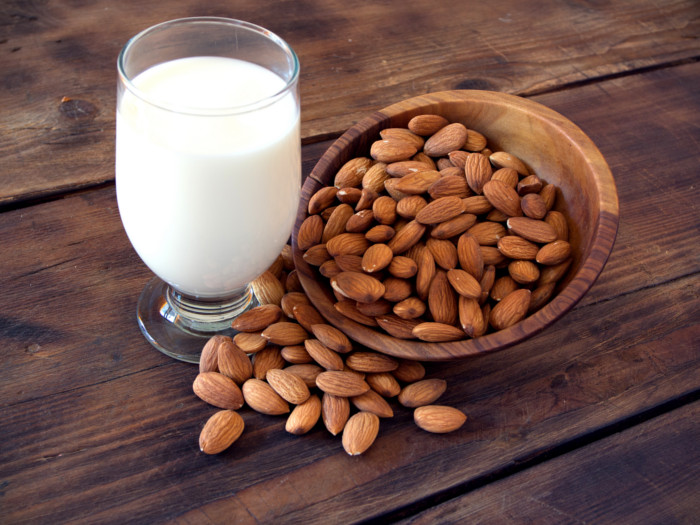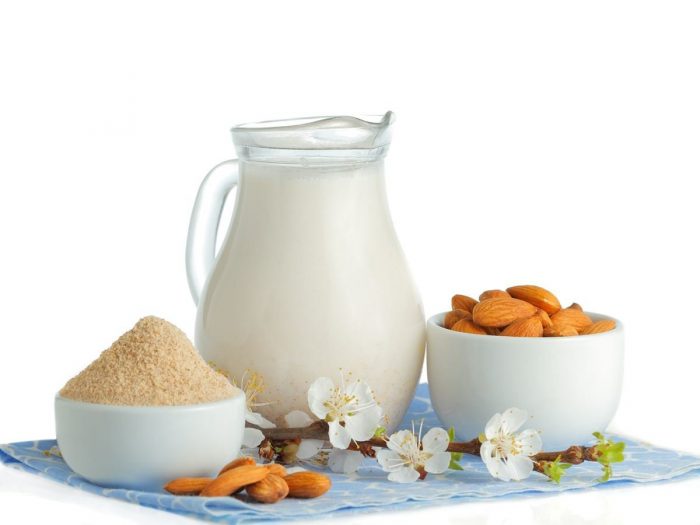The health benefits of almond milk may include weight loss, stronger bones, improvement of vision, and a healthy heart. It also helps in building strong muscles, maintaining ideal blood pressure, and ensuring a properly functioning kidney. It is a good alternative for nursing mothers’ milk.
What is Almond Milk?
Almond milk is obtained from almond nuts. This plant-based milk has a creamy texture and nutty flavor. It has zero lactose and cholesterol present in it. There are also unsweetened almond milk varieties available in the market, which is a healthy option for those who prefer it sugar-free.
Most people have easy access to dairy milk. Speedily becoming popular, almond milk has been used for years as a substitute for cow milk that is readily available and relatively easy to get. Dairy milk is known for its high content of various vitamins and minerals but almonds have been proven to contain extra nutrients. This is why almond milk is recommended as a good option for those who do not consume any form of dairy products, those who have cow milk allergy/intolerance (CMA/CMI), or people who are vegans. [1]
| Serving Size : | |
|---|---|
| Nutrient | Value |
| Water [g] | 96.54 |
| Energy | 15 |
| Energy [kJ] | 65 |
| Protein [g] | 0.4 |
| Total lipid (fat) [g] | 0.96 |
| Ash [g] | 0.79 |
| Carbohydrate, by difference [g] | 1.31 |
| Fiber, total dietary [g] | 0.2 |
| Sugars, total including NLEA [g] | 0.81 |
| Sucrose [g] | 0.81 |
| Starch [g] | 0.07 |
| Calcium, Ca [mg] | 184 |
| Iron, Fe [mg] | 0.28 |
| Magnesium, Mg [mg] | 6 |
| Phosphorus, P [mg] | 9 |
| Potassium, K [mg] | 67 |
| Sodium, Na [mg] | 72 |
| Zinc, Zn [mg] | 0.06 |
| Copper, Cu [mg] | 0.02 |
| Manganese, Mn [mg] | 0.04 |
| Selenium, Se [µg] | 0.1 |
| Riboflavin [mg] | 0.01 |
| Niacin [mg] | 0.07 |
| Pantothenic acid [mg] | 0.01 |
| Folate, total [µg] | 1 |
| Folate, food [µg] | 1 |
| Folate, DFE [µg] | 1 |
| Choline, total [mg] | 3.1 |
| Vitamin E (alpha-tocopherol) [mg] | 6.33 |
| Vitamin E, added [mg] | 6.33 |
| Tocopherol, beta [mg] | 0.12 |
| Tocopherol, gamma [mg] | 0.32 |
| Tocopherol, delta [mg] | 0.13 |
| Vitamin D (D2 + D3), International Units [IU] | 41 |
| Vitamin D (D2 + D3) [µg] | 1 |
| Vitamin D3 (cholecalciferol) [µg] | 1 |
| Vitamin K (Dihydrophylloquinone) [µg] | 0.1 |
| Fatty acids, total saturated [g] | 0.08 |
| 14:0 [g] | 0 |
| 15:0 [g] | 0 |
| 16:0 [g] | 0.07 |
| 18:0 [g] | 0.02 |
| 20:0 [g] | 0 |
| Fatty acids, total monounsaturated [g] | 0.59 |
| 16:1 [g] | 0.01 |
| 16:1 c [g] | 0.01 |
| 17:1 [g] | 0 |
| 18:1 [g] | 0.56 |
| 18:1 c [g] | 0.56 |
| Fatty acids, total polyunsaturated [g] | 0.24 |
| 18:2 [g] | 0.25 |
| 18:2 n-6 c,c [g] | 0.25 |
| Sources include : USDA [2] | |
Almond Milk Nutrition Facts
Almond milk prepared from almonds is low in fat but high in energy, proteins, lipids, and fiber. As per the USDA, almonds contain minerals like calcium, iron, magnesium, phosphorus, potassium, sodium, and zinc. The other nutrients available in this milk include vitamins such as vitamin C, vitamin B6, thiamine, riboflavin, niacin, folate, and vitamin E. All these nutrients have various benefits which are essential for a healthy body. [3]
Buying and Preparing Almond Milk
Almond milk contains no cholesterol or lactose and can be extracted using simple equipment found in most homes. This milk is prepared by grinding almond seeds together with water. The use of a blender is one of the modern ways that can be used to get almond milk extracted with all of its nutrients intact. This is the easiest and simplest way to obtain this nutritious and delicious milk.
It is also used commercially, where additional nutrients are used to enrich the content of the final product. Almond milk can be purchased from stores and it is found in different flavors including chocolate, vanilla, and plain. Almond milk with a specific flavor is preferred over the plain alternative.
Due to its nutritional content, it is the best alternative for those who have an intolerance to dairy or soy products. The nutritional value of almond milk is equivalent to that found in rice milk, which is also recommended by nutritionists.

Almond milk has a creamy texture and nutty flavor. Photo Credit: Shutterstock
Health Benefits of Almond Milk
With so many nutritional values that almond milk has for us, the possible health benefits of this milk are great. Let’s have a look at them.
May Aid Weight Management
Almond milk is a popular plant-based milk alternative that is low in calories and carbohydrates, and it is also a good source of fiber. These factors make it a good choice for people who are trying to manage their weight.
According to a study conducted over 4 weeks, the results showed that daily substitution of one serving of dairy product with one cup (240 ML) of almond milk significantly decreased body weight, body mass index and waist and hip circumference. [4]
Another review of 64 randomized controlled trials and 14 systematic reviews and/or meta-analyses found that almonds may help people lose weight or maintain a healthy weight by reducing hunger, increasing satiety, and increasing resting energy expenditure. [5]
May Help Reduce Blood Pressure
A report published in the Scientific Research Publishing states that the consumption of almond milk helps in reducing and maintaining blood pressure. Almond milk is the best alternative for people who have an intolerance to soy and dairy products. This is because all the minerals and vitamins of soy and other dairy products are found in almond milk. The movement of blood in the body takes place through veins. [6]
In order for them to function properly, they need to be able to contract and expand freely to allow for the free flow of blood to and from the different parts of our body. This depends on vitamin D and minerals such as phosphorus to keep them in the right condition. Blockage and poor movement of blood within the veins may result in high blood pressure, which can be a life-threatening medical condition. These nutrients may be insufficient in those people who do not consume soy or dairy products, so almond milk can be a way to supplement those lacking nutrients and keep the heart in a healthy state.
Another study provides evidence that almond intake may be a helpful way to lower blood pressure, especially in people with lower SBP and who consume almonds in moderation. [7]
However, more research is needed to confirm these findings and to better understand the mechanisms by which almonds may affect blood pressure.
Can Help Maintain A Healthy Heart
The complete lack of cholesterol in almond milk makes it a powerful enabler of a strong and healthy heart. It is far better than other foods that add to LDL or bad cholesterol levels, which is the culprit for many cardiovascular ailments.
Another study found that daily consumption of around 45 grams of almonds can help reduce LDL-C and maintain or even increase HDL-C levels in Indians. This is because almonds contain a number of nutrients that are beneficial for cardiovascular health, such as monounsaturated fats, fiber, and vitamin E. [8] [9]
Consuming almond milk guarantees the presence of potassium in the body which is a key element that acts as a vasodilator and reduces tension and strain on the heart.
May Help Strengthen Muscles
Building muscles is a process that can be accelerated by consuming the right type of food, specifically which contains vitamins and minerals that have a direct impact on muscle mass. Almond milk, for example, contains riboflavin, which is a form of vitamin B and calcium that has been proven to work in conjunction with other nutrients like iron to regulate muscle strength and growth. According to Self Nutrition Data, a cup of almond 240 ml of milk provides 20–45% of the recommended daily consumption for calcium. [10]
It is also a good source of protein, and according to a study, high-protein dairy milk beverages helped the participants gain more muscle strength during the progressive resistance training program. It contains a type of protein called alpha-lactalbumin, which has been shown to promote muscle growth and repair. [11] [12]
May Help Improve Kidney Health
There are minerals such as calcium and potassium that can be harmful to the kidneys if present in an excess amount in the body. Almond milk contains a limited amount of phosphorus and potassium, which is not the case with dairy and soy products. It is advisable that people suffering from chronic or acute kidney conditions should strive to reduce the intake of foods that contain these minerals in such high amounts. Almond milk can serve the same general purposes of milk while also being beneficial for people who are trying to reduce the presence of potassium in their bodies. [13]
May Aid in Skin Care
Skin relies on different types of vitamins and minerals to keep it in its optimal state. Consumption of almond milk, which contains plenty of vitamin E, helps in maintaining skin health. A study published in the journal Nutrients demonstrates that daily almond consumption may reduce wrinkle severity in postmenopausal females to potentially have natural anti-aging benefits.
Apart from the vitamins, it also has antioxidants that may assist in repairing damaged skin, as well as possibly regulating vitamin A. These vitamins are available in both the almond milk that is processed at home as well as the one that is processed and sold commercially. It can also be used as a skin-cleansing lotion. For best results, add rosewater to almond milk to cleanse the skin. [14] [15]
May Help Improve Vision
Almond milk is rich in various vitamins, including vitamin A, which is essential for the proper functioning of the eyes. The use of computers, smartphones, and tablets is common in most offices and homes in our modern age. Constant use of these devices can affect the vision of the user to a certain extent. This condition can be treated naturally by increasing the intake of vitamin A, which you can access in almond milk. [16]
May Strengthen Bones
Almond milk contains calcium, which is required for forming and maintaining teeth and bones. Calcium is required for blood clotting, relaxing muscles, and maintaining a normal heartbeat. The inclusion of almond milk in the diet supplies calcium to the body and benefits the healthy bone growth of adults as well as infants. It also helps in reducing the risk of osteoporosis. One serving of almond milk contains 30% of the daily requirement of calcium, which functions together with other vitamins such as vitamin D to make sure our bones last well into our old age. [17] [18] [19]
May Help Boost Immunity
Almond milk has various nutrients and minerals which help in maintaining a healthy immune system. The immune system protects our body from germs and microorganisms that may cause health issues and are harmful to the body. Intake of almond milk may help in keeping the body’s primary line of defense healthy and strong.
May Act as a Substitute for Breast Milk
Almond milk contains vitamins and minerals that are similar to those found in a nursing mother’s breast milk. This is because it contains a considerable amount of vitamins C and D, as well as iron, which is very important for the growth and well-being of infants. It is also possibly rich in protein, making it a perfect substitute for food, just like other healthy foods like rice and soy milk. [20]
How to Make Almond Milk
Almond milk can be easily prepared at home with very few ingredients. Let us look at the recipe below :

Fresh Almond Milk Recipe
Ingredients
- 1 cup almonds
- 2 cups water
- 1 tsp honey/sugar to taste
Instructions
- To make almond milk, first and foremost, soak the almonds overnight in water and then rinse them.
- The next day, blend the almonds in fresh water.
- Once done, filter the almond pulp using a fine strainer.
- You may then add a sweetener of your choice - honey or sugar, as per your preference, to enhance the taste. Fresh almond milk is now ready to be consumed. This is the best substitute of milk for vegans.

Notes
Almond Milk FAQs
Is almond milk good for you?
Almond milk rich in various nutrients is very good for health. It contains energy, protein, and minerals such as calcium, potassium, and sodium. Further, it is a good source of vitamin D and vitamin E that help in improving cognitive health along with skincare and hair care.
What is almond milk?
Almond milk is non-dairy milk that is made from almonds. It does not contain any lactose and hence is suitable for drinking by those who have lactose intolerance. It can be easily prepared at home and is also available in grocery stores in various flavors such as sweetened, plain, vanilla, etc.
Is almond milk healthy?
Almond milk is healthy plant milk that can help enhance heart and bone health. It is rich in vitamin A and helps improve vision. It further aids in improving the health of kidneys and skin. Apart from this, those of you who are lactose intolerant can substitute normal milk with this one and enjoy all the benefits.
Is almond milk dairy?
No, almond milk is non-dairy milk. It is plant-based milk that is prepared from almonds. Unlike dairy milk, it does not contain any lactose. And can be used by vegans and people with lactose intolerance
Is almond milk bad for you?
Almond milk has many benefits but in case you are allergic to tree nuts then you must avoid intake of almond milk. Symptoms of allergy may include difficulty in breathing, unconsciousness, and red spots on the skin, which can also be itchy.
How many calories are present in almond milk?
One cup of unsweetened almond milk contains 39 calories. You can also check it on the product display if you buy it from any grocery store. The calorie count may vary depending on the type of almond milk. For example, sweetened almond milk will have a higher calorie count than the unsweetened variety.
Where does almond milk come from?
Almond milk comes from grinding almonds in a blender with water and straining the pulp. It is plant-based milk and has many benefits. You can also make almond milk by mixing water with almond butter.
How many carbohydrates are present in almond milk?
1 cup of unsweetened almond milk provides 1.5 grams of carbohydrates. Carbohydrates are nutrients that can help in providing energy to all parts of the body. Moreover, they may also aid in the smooth functioning of various processes such as digestion.
How much calcium is present in almond milk?
One cup of unsweetened almond milk contains 516 mg of calcium. Calcium helps in promoting the good health of bones and teeth. Drinking almond milk may aid in strengthening the bones. One more reason to add it to your diet!
How much protein does almond milk contain?
Almond milk contains protein along with other nutrients and minerals. 1 cup of unsweetened almond milk has 1.55 grams of protein. Our body needs protein to build bones, muscles, and tissues. And it also helps in the production of various hormones and enzymes.
Is almond milk fattening?
Almond milk is very low in fat so its intake surely doesn’t add any excess fat to your body. 1 cup of unsweetened milk contains just 2.88 grams of fat and 39 calories, which are both very low. So add almond milk to your diet without the fear of adding an extra pound to your body.

